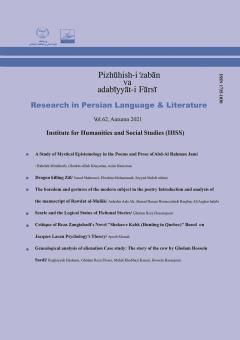Searle and the Logical Status of Fictional Stories
Subject Areas : Research in Contemporary Iranian Literature
1 - Assistant Professor of Imam Khomeini and Islamic Revolution Research Institute. Tehran, Iran.
Keywords: Searle, Fictional Discourse, Illocutionary acts, Semantic Rules of Speech Acts. ,
Abstract :
Searle basically draws attention to the subtle differences that exist between different types of verbal verbs.According to him, speaking or writing in a language is the performance of a very specific type of spoken verb, which is called illocutionary acts.In this respect, the existence of a narrative discourse poses a problem for one who believes in such a view; That is, how can we understand a work of fiction, even if the author's seemingly violates some important rules of language use?Searle's great effort, in this context, is to analyze the concept of fiction but not the concept of literature. In fact, the aim is to explore the difference between fictional and serious utterances not to explore the difference between figurative and literal utterances.According to Searle, The author of a work of fiction pretends to perform a series of illocutionary acts, normally of the assertive type. He believes what makes fiction possible, is a set ofextralinguistic, nonsemantic conventions that break the connection between words and the world established by the semantic rules of speech acts and in the same sense, the pretended performances of illocutionary acts which constitute the writing of a work of fiction consist in actually performing utterance acts with the intention of invoking the horizontal conventions that suspend the normal illocutionary commitments of the utterances. Thus, the purpose of this paper is to examine, analyze and critiqe Searle's view of the logical status of fictional discourse.
Austin, John (1962) How To Do Things With Words, Oxford: Oxford University Press.
Fotion, Nick (2003) “From Speech Acts to Speech Activity”, in Smith, Barry (ed) John Searle, Cambridge: Cambridge University Press.
Hacker, P. M. S (1990) Wittgenstein, Meaning and Mind, Volume 3 of An Analytical Commentary on the Philosophical Investigations, Oxford: Basil Blackwell.
Martinich, A. P. (2001) “John R. Searle”, in Martinich A. P. and Sosa, David (eds) A Companion to Analytic Phlosophy, Oxford: Blackwell Publishers Ltd.
Searle, J. R. (2002) “Speech Acts, Mind, and Social Reality”, in Grewendorf, G. & Meggle, G. (eds) Speech Acts, Mind, and Social Reality; Discussions with John R. Searle, Springer Science+Business Media, B. V.
-------------- (2001) “J. L. Austin”, in Martinich A. P. and Sosa, David (eds) A Companion to Analytic Phlosophy, Oxford: Blackwell Publishers Ltd.
-------------- &Vanderveken, D. (1985) Foundations of Illocutionary Logic, Cambridge: Cambridge University Press.
-------------- (1979) Expression and Meaning; Studies in the Theory of Speech Acts, Cambridge: Cambridge University Press.
-------------- (1969) Speech Acts, An Essay in the Philosophy of Language,Cambridge: Cambridge University Press.
-------------- (1968) “Austin on Locutionary and Illocutionary Acts.” Philosophical Review 77: 405 - 424.
Smith, Barry (2003) “John Searle: From Speech Acts to Social Reality”, in Smith, Barry (ed) John Searle, Cambridge: Cambridge University Press.
Wittgenstein, Ludwig (1981) Zettel, translated by G. E. M. Anscombe, Oxford: Basil Blackwell.
------------------------- (2009) Philosophical Investigations, translated by G. E. M. Anscombe, P. M. S. Hacker and Joachim Schulte, Revised fourth edition by P. M. S. Hacker and Joachim Schulte, London: Blackwell Publishing.


